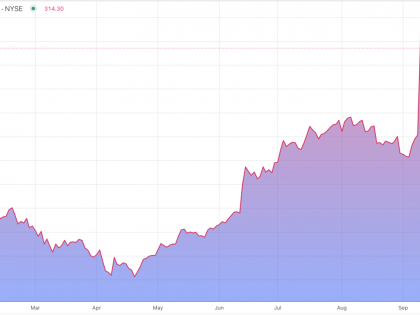Oracle Surges 35% in Biggest One-Day Rally in 26 Years
By Impact Desk | Updated: September 17, 2025 18:18 IST2025-09-17T18:17:27+5:302025-09-17T18:18:34+5:30
Oracle suddenly found itself in the spotlight of global investors. The trading session on September 10 ended with the ...

Oracle Surges 35% in Biggest One-Day Rally in 26 Years
Oracle suddenly found itself in the spotlight of global investors. The trading session on September 10 ended with the most significant one-day increase in the company's shares in 26 years, with its stock price jumping 35%. The key reasons for investor focus and growth were quarterly results and the revision of long-term forecasts in the cloud business. Even though revenue and profit turned out to be slightly lower than expected, investors were impressed by the growth rate of the cloud segment and the scale of new contracts. The results immediately became a key date on the US economic calendar, drawing attention from traders and fund managers worldwide.
In Q1 of fiscal year 2026, Oracle's revenue amounted to an impressive $14.93 billion, an increase of 12% year-on-year. The cloud business brought in $7.19 billion, while cloud infrastructure (OCI, IaaS) grew by 55% to $3.3 billion, and cloud applications (OCA, SaaS) increased by 11% to $3.8 billion. These fluctuations inevitably affected major indices — S&P 500 and Dow Jones — as well as their derivatives, including S&P 500 and Dow futures.
An important factor was the growth in the remaining performance obligations (RPO) volume, which reached $455 billion, an increase of 359% year-on-year. CEO Safra Catz said the company expects to conclude new multibillion-dollar agreements in the coming months, raising the RPO above half a trillion. The rapid growth in demand for cloud power for artificial intelligence tasks is at the center of these changes. OpenAI recently signed a five-year, $300 billion contract with Oracle, which has become one of the most significant agreements in the history of cloud computing. We are talking about providing 4.5 GW of power capacity, comparable to the energy consumption of millions of households.
For OpenAI, this step is designed to compensate for the insufficient infrastructure on Microsoft Azure and other clouds and ensure scaling within the Stargate project. Oracle, in turn, is consolidating its status as a hyperscaler competing with AWS and Microsoft. The sharp increase in Oracle's capitalization has had a direct impact on its founder’s position. Larry Ellison's share in the company is now estimated at $393 billion, which allowed him to overtake Elon Musk and take first place in the ranking of the richest people in the world. At the same time, it became the largest one-day increase in personal wealth in the history of the billionaires index. It is noteworthy that close ties remain between Ellison and Musk. Their rivalry looks obvious on the stock market today, as Oracle shares soared by more than 35% intraday, and the company's capitalization approached $1 trillion.
Oracle's growth has automatically increased investor interest in infrastructure solution providers. Nvidia, whose components account for up to 70% of the cost of a typical server for AI workloads, has increased in price by almost 4%. Its chip manufacturing partner, TSMC, also added 4% after publishing data on August revenue growth of 34% year-on-year. Broadcom shares rose by 10% due to information about a large order from OpenAI. AMD gained 2%, and even minor players such as Micron, Supermicro, and Dell showed a rise in stock prices. Thus, Oracle has overnight become a symbol of a new technological era where computing power is becoming as strategically important as oil or gas in the 20th century. Its success has increased investor optimism about the entire sector. Oracle's growth has become a catalyst for strengthening the stocks of Nvidia, TSMC, Broadcom, and other players. The long-term bet on artificial intelligence is changing the balance in the industry, and Oracle has proven that it can play in this league on an equal footing with the largest cloud corporations.
Open in app